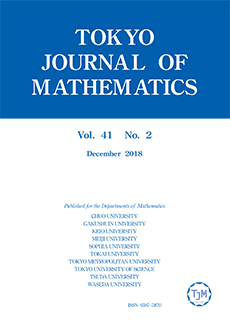Abstract
Let $q$ with $|q|>1$ be an integer in an algebraic number field $\mathbf{K}$ given below, and $\{a_n\}$ a periodic sequence in $\mathbf{K}$ of period two, not identically zero. Let $f(q)=\sum_{n=1}^{\infty}{a_n}/(1-q^n).$ We prove that (i) If $\mathbf{K}$ is either the rational number field $\mathbb{Q}$ or an imaginary quadratic field, then $f(q)\notin \mathbf{K}$. (ii) For an algebraic integer $q$ such that $|q|>1$ and $|q^{\sigma}|<1$ for any $\sigma \in$ $\textrm{Aut}(\overline{\mathbb{Q}}/\mathbb{Q})$ with $q^\sigma\ne q$, if $k=\mathbb{Q}(q)$, then $f(q)\notin \mathbb{Q}(q)$. For example, the three numbers $$ 1\,,\quad \sum_{n=1}^{\infty}\frac{1}{q^n-1}\,, \quad \sum_{n=1}^{\infty}\frac{1}{q^n+1} $$ are linearly independent over $\mathbb{Q}$ for every $q\in\mathbb{Z}$ with $|q|\geq2.$ Further, irrationality results of the special values of the functions $$ \sum_{n=1}^{\infty} \frac{z^n}{R_{an+b}}\,,\qquad \sum_{n=1}^{\infty}\frac{z^n}{R_{an+b}R_{{a(n+1)}+b}}~~(z\in\mathbb{C}) $$ can be deduced, where $a>0$, $b\geq0$ are integers and $R_n$ is a certain binary recurrence.
Citation
Yohei TACHIYA. "Irrationality of Certain Lambert Series." Tokyo J. Math. 27 (1) 75 - 85, June 2004. https://doi.org/10.3836/tjm/1244208475
Information





